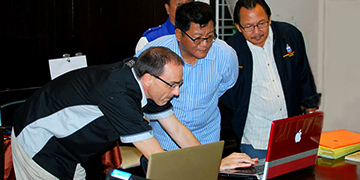Webonary is certainly not the only software that produces dictionaries. Here is a comparison to some others.
Comparison to Lexique Pro
Lexique Pro is a fine piece of software, one that some have used to put their dictionaries online. If you have your data in Lexique Pro already, that might be your best choice, especially if you have only a few words in your dictionary.
Webonary can handle bigger dictionaries, will allow you to update dictionaries as time goes on, has a better search engine, and has more opportunities for customization and support. Webonary depends on FLEx for layout, though, so you would need to first import your data in FieldWorks to use Webonary.
Lexique Pro requires a computer to retrieve all the dictionary entries for a particular letter before it can display one entry, which can take a long time if the dictionary has a lot of entries. The approach Webonary uses allows fast searching for a word.
Webonary searches the entire database for a word, whether it occurs as a headword or in the definition, and places the more relevant search results at the top of the list.
Webonary easily imports new and changed dictionary entries from FieldWorks Language Explorer (FLEx).
Since Webonary is based on WordPress code, support is not limited to a single software developer. Millions of people use WordPress worldwide.
The approach we are using gives the option for people in the language community to make comments about a particular entry. For example, someone might say that an entry is missing a sense. Someone authorized to make changes to the dictionary can determine if the comment is accurate, and if so, can make the appropriate change
Lexique Pro runs only on Windows. Webonary runs on Windows, Linux, and Mac.
Comparison to Aboriginal Dictionaries
Several Aboriginal lexicons have been put on the web. The data for these were collected with Toolbox, and Drupal was used for building the sites. While these sites act like a paper dictionary, they lack the search capability built into Webonary.
Comparison to LEXUS
We have not had an opportunity to review the software. However, looking at a presentation that Jacquelijn Ringersma gave, the chief feature of LEXUS is to create a lexicon from scratch. We using FLEx to create our lexicons, and export the data to Webonary.
Comparison to the Project for Free Electronic Dictionaries at the University of Sydney.
The project started in 2007 and is "still in its infancy" as late as February 2011. Their demo of the cell phone produced an error. It is not clear what to do with the rest of the site. But two things are of interest: 1) "A large part of the project lies in creating a software package that can be used to easily convert dictionary files, such as toolbox/shoebox databases, into the more flexible XML format..." 2) They are using a Creative Commons license. This is a project worth watching for producing cell phone dictionaries.
Comparison to Yurok Language Project at the University of California, Berkeley
The site looks very much like a WordPress site. However, the software used to build this site is unknown, much less whether it is open and available for use.

 Webonary gives language groups the ability to publish bilingual or multilingual dictionaries on the web with a minimum of technical help.
Webonary gives language groups the ability to publish bilingual or multilingual dictionaries on the web with a minimum of technical help. With lexical data in FLEx, the process is simple: 1.
With lexical data in FLEx, the process is simple: 1. 
